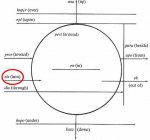I did not realize that I was disagreeing with Thayer's.
Not according to Scripture.
In James 2:21, notice closely that James does not say that Abraham's work of offering up Isaac resulted in God accounting Abraham as righteous. The accounting of Abraham's faith as righteousness was made in Genesis 15:6, many years before his work of offering up Isaac recorded in Genesis 22. The work of Abraham did not have some kind of intrinsic merit to account him as righteous, but it showed or manifested the genuineness of his faith. (James 2:18) That is the "sense" in which Abraham was "justified by works." He was shown to be righteous.
In James 2:22, faith made perfect or complete by works means to complete like love in 1 John 4:18, in regard to maturity. It does not mean that Abraham's faith remained incomplete to save him in Genesis 15:6 (when his faith was accounted to him for righteousness) until many years later, after he offered up Isaac on the altar in Genesis 22. It also does not mean that Abraham was finally saved based on the merits of his works after he offered up Isaac on the altar many years later in Genesis 22 either.
When Abraham performed the good work in Genesis 22; he fulfilled the expectations created by the pronouncement of his faith in Genesis 15:6. Abraham was accounted as righteous based on his faith (Genesis 15:6) not his works (Romans 4:2-3) long before he offered up Isaac on the altar in Genesis 22.
In James 2:22, faith made perfect or complete by works means to complete like love in 1 John 4:18, in regard to maturity. It does not mean that Abraham's faith remained incomplete to save him in Genesis 15:6 (when his faith was accounted to him for righteousness) until many years later, after he offered up Isaac on the altar in Genesis 22. It also does not mean that Abraham was finally saved based on the merits of his works after he offered up Isaac on the altar many years later in Genesis 22 either.
When Abraham performed the good work in Genesis 22; he fulfilled the expectations created by the pronouncement of his faith in Genesis 15:6. Abraham was accounted as righteous based on his faith (Genesis 15:6) not his works (Romans 4:2-3) long before he offered up Isaac on the altar in Genesis 22.
I like what you said about maturity in your 2nd paragraph above. It matches the word in the verse typically used to speak of maturity.
I retain a few concerns about the view that initial faith in all cases is sufficient to save since Authentic Faith grows and does works, and salvation is a bigger topic than initial justification.
I also think we're pushing the language a bit to have to make justified mean "show" (or such) in James2:21, 24. I do see and know your points re: God being justified, etc. But for one among a few things, I also see Abraham being tested in the sacrificing of his son (Heb11:17) and testing not just proving/showing righteousness - testing can also result in failure - but in a sense to pass a test or tests can also be seen to result in vindication/declaration of righteousness/justification in the test. IOW, to be proven is not that much different than to be deemed righteous.
Also, the wording in 2:18 is active - the person actively shows/gives evidence/proof from/as a result of his works and in 2:21, 24 as a result of his works (under testing) Abraham was deemed righteous (passive vs. actively showing/proving). We can look at this passive a bit in the way we translate it, but what or who justifying other than God (the one testing Abraham) is that meaningful?
Thanks for the responses.
-
1
- Show all

